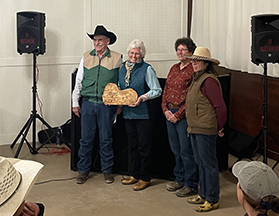Backcountry Horsemen of California


BCHA Director for Public Lands & Recreation Randy Rasmussen recently announced a major reorganization of the United States Forest Service.
The following changes are being made:
1. The Forest Service will phase out the nine Regional Offices over the next year and implementation activities will take into consideration the ongoing fire season. The Forest Service will maintain a reduced state office in Juneau, Alaska and an eastern service center in Athens, Georgia. The current stand-alone Research Stations will be consolidated into a single location in Fort Collins, Colorado. The Forest Service will retain the Fire Sciences Lab and Forest Products Lab - the former, vital for protection from forest fires and the latter, critical for assessing market development opportunities for timber and other forest products and related industries.
2. 15,364 individuals (note: this is UDSA wide) voluntarily elected deferred resignation. This re-alignment will be undertaken to mitigate adverse consequences to those agencies which rely upon temporary workforces that increase at different times of the year. Examples include Forest Service Consolidate grants and financial assistance to provide better controls and promote efficiency. This consolidation will include, where feasible, the transfer of grant making and administration functions from USDA offices and agencies that currently have limited capacity to perform such duties to other offices and agencies. increases during the spring and summer months due to wildland firefighting.
3. Consolidate Legislative Affairs functions into the Office of Congressional Relations
This may or may not mark a change in how the Forest Service does business and how accessible it is to partners like BCHA and BCHC, including its grants and agreements. This could mean a difference in how grants are processed, how volunteer agreements are handled, and even saw agreements. More information will be posted as it becomes available.
See the official announcement from U.S. Secretary of Agriculture Brooke L. Rollins, July 24, 2025.
(1) TAHOE NATIONAL FOREST E BIKE COMMENTS (Action needed)
The USDA Forest Service Tahoe National Forest is at the beginning stages of planning an environmental analysis for the Tahoe National Forest E-Bike Trail Designation Project. A legal notice to prepare an environmental assessment is anticipated to be published September 6, 2024.
The Forest Service proposes to designate select trails, on up to 143 miles of Forest Service system trails, as open to Class 1 E-Bikes throughout Tahoe National Forest in the counties of: Nevada, Placer, Sierra and Yuba.
If you would like to provide scoping input, please submit written comments within 30 days of the date the legal notice is published in Grass Valley’s The Union newspaper. Commenters should not rely upon dates or time frame information provided by any other source. It is the commenter's responsibility to ensure timely receipt of comments (36 CFR 218.25).
The project is on the Tahoe’s Project web page at https://www.fs.usda.gov/project/tahoe/?project=66218 (if link does not work, please copy and paste into your browser). You can also find it on the Tahoe National Forest home page. Refer to the upper tabs under “Managing the Land”, then select “Projects.” Once on the Tahoe Projects web page, scroll down and select "Tahoe National Forest E-Bike Trail Designation". On that Project’s web page under Project Documents, select the "Scoping" folder for project information. Under the right-hand column heading "Get Connected", select "Comment/ Object on Project".
Postal comments may be sent to: Forest Supervisor, Attn: Beth Martinez, Tahoe National Forest Acting Forest Supervisor, c/o Karen Walden, Attn: Forest E-Bike Trail Designation, 631 Coyote Street, Nevada City, CA, 95959.
(2) BCHA encourages all members to use the E-Bike Reporting Form and the Horse Camp Incident Form when they see problems.
E-Bike Reporting Form
Horse Camp Incident Form
“Public land” refers to government-owned and managed land. It serves various purposes and is overseen by different entities. California has the third most public land in the U.S. (after Alaska and Nevada). Almost one-half of California is owned and managed by the government (about 51 million or 49% of California’s 104 million acres).
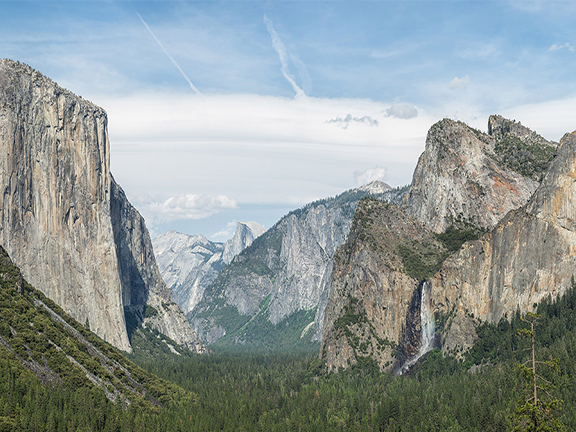
California’s Yosemite National Park (By Diliff, wikimedia.org)
Four government agencies manage about half of the land in California. Here is a breakdown:
| FEDERAL | ||
| U.S. Forest Service (USFS) | 21 million acres | (19.8%) |
| Bureau of Land Management (BLM) | 15 million acres | (14.5%) |
| U.S. National Park Service (NPS) | 7.6 million acres | (7.3%) |
| U.S. Department of Defense | 3.8 million acres | (3.7%) |
| Bureau of Indian Affairs (BIA) | (0.6%) | |
| U.S. Fish and Wildlife Service (USF&WS) | (0.3%) | |
| STATE | ||
| State Departments of Parks and Recreation | (1.3%) | |
| California Fish and Wildlife | (0.6%) | |
| California State Lands Commission | (0.5%) | |
| LOCAL | ||
| Los Angeles Department of Water and Power | (0.4%) |
BCHC, in partnership with governmental agencies such as the USFS, BLM and NPS, is
dedicated to preserving and maintaining the backcountry wilderness for future generations to
enjoy and to use saddle and pack stock in a backcountry wilderness environment.
BCHC works with public lands agencies on a regular basis and has helped keep public lands
open by volunteer-based trail maintenance and trail repair.
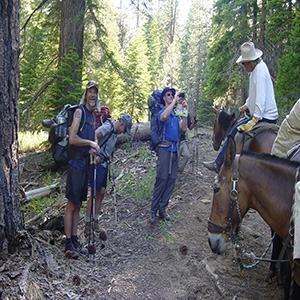

Throughout California, BCHC volunteer members contribute thousands of hours each year
keeping trails maintained and open on government-owned public lands.
In 2022,
Back Country Horsemen members
from 32 different states donated over 207,800 volunteer hours with a dollar value of over $12
million. 14,779 stock animal hours (horses and mules) were used with volunteers traveling over
1.2 million miles to locations to do volunteer work.
The total volunteer hours donated by Back Country Horsemen over the past 28 years was
6,950,429 with a dollar value of $192,494,393.
Regardless of the work done by this single organization and others like it, the trail maintenance
backlog grows worse every year. The Forest Service has more miles of trail than it has been able
to maintain, resulting in a persistent maintenance backlog with a range of negative effects. Trail
users witness the deteriorating condition of forest trails that, in many cases, prevent public access
due to unsafe or impassible conditions.
In 2020, Congress enacted the Great American Outdoors Act to provide up to $1.3 billion
annually for five years to rebuild trails, roads, bridges, shelters, visitor centers and other
facilities. At that time, the backlog was around $14 billion. Unfortunately, the current
administration is spending the money on long-term solutions rather than short-term “Band-Aid”
projects, and the need has grown to an estimated $22.3 billion.
With Congress continuing to view public lands funding as a low priority, BCHC and similar
organizations are expected to maintain more trail miles each year. If BCHC and others do not
volunteer this maintenance service, trails will become overgrown from neglect and public access
will become increasingly limited.
Keep America’s trails open for future generations!

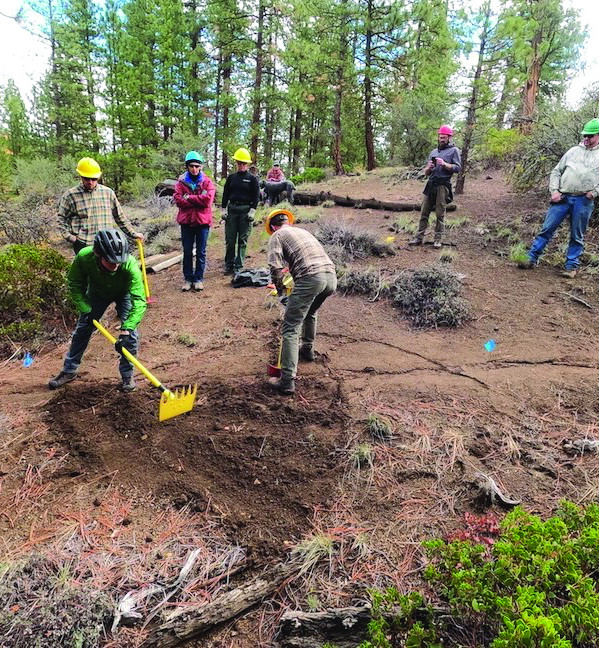
To know what’s going on with Public Lands, be proactive and the “boots on the ground” for
BCHC. Watch what is happening in your local area, your county and the State of California as
well as with the federal government.
Here are some ways to find out what’s going on with Public Lands:
The State Public Lands Committee acts under the authority of the BCHC State Board with a Vice
President (or Co-Vice Presidents) elected by that board.
The State Public Lands Committee is made up of one delegate from each BCHC unit and meets
at the same date and place as the State Board. The Public Lands Committee is charged to
monitor all activities taking place that affect the use of California’s public lands. For more
information, contact the BCHC VP of Public Lands.
Randy Rasmussen is BCHA’s full-time Director for Public Lands & Recreation. One of his primary roles is assisting BCHA’s Executive Committee and state organizations like BCHC to advance initiatives and strengthen partnerships with public lands managers. Randy works side by side with state BCH organizations to challenge agency decisions. An example is the 2019 lawsuit against the U.S. Forest Service decision to allow motorized bikes to operate on non- motorized trails in the Tahoe National Forest. News, alerts and information are available on the BCHA website.
An important part of each unit is its Public Lands Committee which is responsible for maintaining a line of communication with the public agencies in its respective geographic area(s). The unit’s Public Lands Chair should have good communication skills. It is their responsibility to make initial contact with representatives of land management agencies. It is a good idea to invite agency representatives to a unit meeting, even take them along on a back country trip, to establish good rapport and develop a positive working relationship. Every unit Public Lands Chair is responsible for tracking issues that affect their region, to inform unit members and to encourage written and/or verbal communication with the appropriate entity.
Get on these mailing lists to receive information:
Go to
fastdemocracy.com and sign up to receive
information about state and national bills. You can specify your area(s) of interest. This website
makes it easy to track legislation so you can take timely action on important bills.
When you hear about new legislation and want to know more about it, go to
legiscan.com
, enter the bill number and ask to be notified of any new
action. This site was the nation’s first impartial real-time legislative tracking service designed for
public citizens as well as government affairs professionals regardless of the size of their
organization.
BCHC Action Alert System The best way to get the most current information on urgent public lands requests that may affect your area is to make sure we have your updated email address. BCHC’s electronic Alert System informs members of issues that could affect them. Alerts include a concise description of the issue and summary of arguments both pro and con (if available), so that local units and members can respond individually.
This award was created in honor of Dr. Ben York, Jr., DVM (1924-2011), a member of San Diego Unit.
Dr. York’s working on trails with the PCT and USFS has made a significant impact on the continued use
of pack and saddle stock on the PCT to this day. Dr. York rode the entire length of the Pacific Crest Trail
in the spring, summer and fall of 1992. His ride took place during the last year of his BCHC Presidency.
Dr. York rode the PCT to promote trail riding and the goals and purposes of Backcountry Horsemen.
This award is presented as determined by accomplishments, to the member who, in the
eyes of the judges (BCHC Past Presidents), blazed new trails in some facet of the
operations of the organization. Any member may nominate, by letter, anyone he or she
feels has demonstrated qualities of a “trail blazer.”
2022 recipient: Lynn Joiner, Kern Sierra Unit
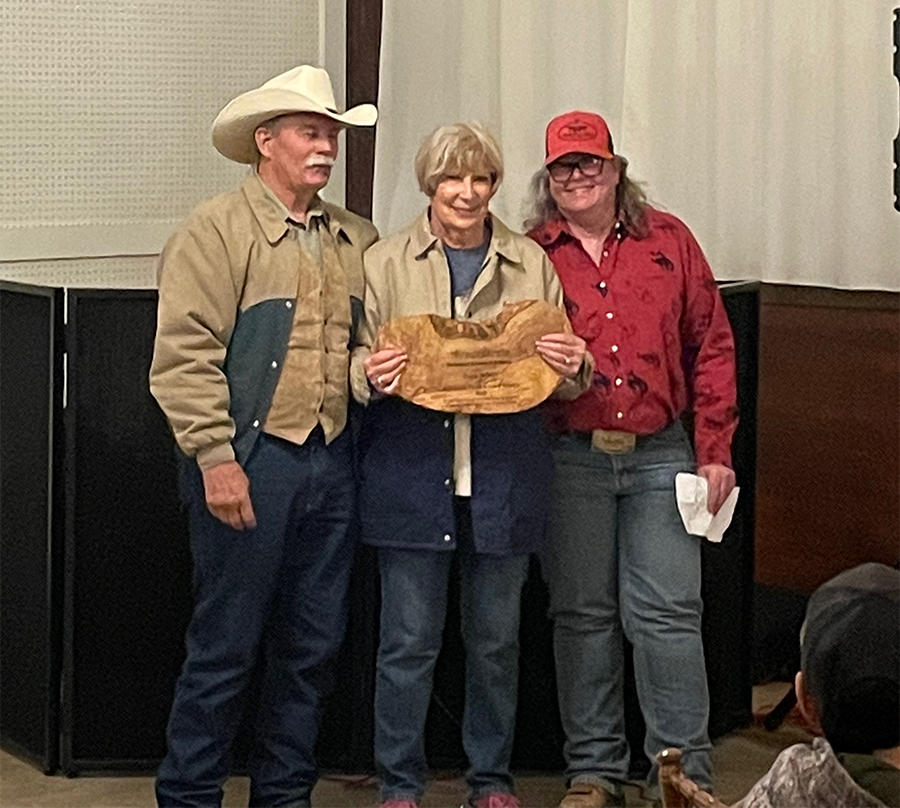
This award was created in honor of Anne Lange (1941-2020), a member of Kern Sierra
Unit, and a founding member of BCHC. Her focus was always on trails and maintaining
them for pack stock use. She was a powerful voice within BCHC, BCHA and in
Washington, D.C., always advocating for trails and keeping them open.
This award is presented annually at Rendezvous to a unit member who goes above and
beyond in the Public Lands arena, and has consistently worked in Public Lands,
improving trails, meeting with agencies, and advocating for trail improvement. The
nominee should have a true passion for preserving Public Lands.
The awards selection process is as follows:
2022 recipient: Marily Reese, High Sierra Unit
